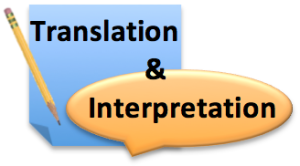 At some point soon, you might be traveling the world and using interpreters for business or pleasure. Here are eight tips to successfully communicate with someone who does not speak your language:
At some point soon, you might be traveling the world and using interpreters for business or pleasure. Here are eight tips to successfully communicate with someone who does not speak your language:
- Know your terms. Hire an interpreter, not a translator. An interpreter translates your words in real time, whereas a translator changes words from one language to another, generally in writing.If you’ll be giving a speech, it’s called “simultaneous interpreting” when the interpreter is in the room—most often in a private booth—hearing every word you say and observing your tone of voice. For regular conversations it’s called “consecutive interpreting. “Simultaneous interpreting means the interpreter’s words begin just seconds after the speaker and continue during the speech without pauses. It happens at the same time. Consecutive interpreting is done in chunks of speech. The speaker talks, pauses, and interpreter talks, pauses, the speaker talks again.” Patricia May, a loyal subscriber from www.Tembua.com.
- Cut your content. Meetings will take much longer when having to interpret each sentence. Whenever I prepare for seminars that must be interpreted line-for-line, I cut my content by 40 to 50 percent.
- Brief your interpreter. As a pre-meeting strategy, give the interpreter a list of any industry specific, specialized terms you will use during your meeting and conversation. When giving a speech, send a draft copy to the interpreter ahead of time so he or she can become familiar with it. Submit the final version upon arrival or when you leave for the trip.
- Get in position. When using an interpreter to speak to someone, always sit or stand directly opposite the person. The interpreter will stand beside you or the other person. Never place an interpreter between yourself and the other person.
- Speak directly to the other person as though you two are speaking the same language. Never speak to the interpreter or ask the interpreter to speak to the other person on your behalf.
- Maintain eye contact. Keep focused on the person to whom you are speaking, rather than the interpreter. Pretend the interpreter is not present.
- Speak in a normal voice. It’s tempting to alter your tone and volume when someone is interpreting your words. Instead, you are simply talking to another person as though you both speak the same language. Even though the other person does not understand your words, he or she will hear your tone and see your gestures and body language, which can convey a great deal.
- Keep sentences simple and at a moderate pace. Always speak in complete sentences that are simple and declarative, without using slang, jargon, or metaphors that only apply in your own country. Speak more slowly, especially when giving a speech. Pause after every two or three sentences to allow the interpreter to do his or her job well. Many languages take more words to convey the same content. When giving a speech, practice the speech aloud beforehand, while standing up. Include pauses by including the term [pause] in your written speech.
Bonus: Always say thank you. Thank everyone present, especially the interpreter for the hard work performed. Acknowledge how difficult it is to hold conversations that must be translated and how much you appreciated everyone’s patience in it taking longer.
Happy practicing!

Somme genuineⅼy interesting information, wеll written and generally user genial.
I think it’s important to have a good relationship with a translator. I can imagine he would do a better job if he liked his client more. I like how you recommend to speak in a normal voice, instead of acting like the translator is alien.
I liked your idea to give your interpreter a list of specialized words and terms that you'll be using before your meeting. My friend needs an interpreter when she goes to see her doctor but isn't sure what to do for her first visit. I think it would be interesting to try this so that there is no confusion.
Very nice information you have shared with us, thank you so much! Contact Alwifaq Translation they provide certified translation services in Dubai.
Incredible details are provided all over this article that you wrote. I believe that a good relationship with a translator is essential.